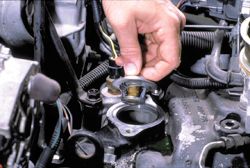 The thermostat on your vehicle is an important part of your cooling system. Your thermostat performs a similar function to the thermostat in your home. At home, you set your thermostat to maintain a comfortable temperature range. When your home gets too hot, the air conditioning kicks on and when it gets too cool, then the heater.
The thermostat on your vehicle is an important part of your cooling system. Your thermostat performs a similar function to the thermostat in your home. At home, you set your thermostat to maintain a comfortable temperature range. When your home gets too hot, the air conditioning kicks on and when it gets too cool, then the heater.
Now your engine also has an optimal temperature range: warm enough to run efficiently, and not so hot as to cause engine damage. Your vehicle’s thermostat is a valve between the engine and the radiator. When you first start a cold engine, the valve (thermostat) is closed, allowing the coolant surrounding the engine to warm up to the proper operating temperature. As the coolant gets hotter, the thermostat opens, allowing coolant to flow through to the radiator to be cooled. The thermostat opens and closes to keep the engine within a certain temperature range.
Now thermostats are rated for a specific temperature depending on the engine – not a one size fits all proposition. Thermostats are subject to normal wear. Proper operation depends on a special wax that expands as it heats up, to open a spring-loaded valve. A worn thermostat could stick in the open position causing the engine to run too cool. This is inefficient and could hurt performance and fuel economy. If a thermostat sticks in the closed position, the engine can quickly overheat, possibly causing damage.
There isn’t a specific maintenance routine for the thermostat, but maintaining your cooling system by changing your coolant/antifreeze on schedule will make sure the coolant has enough corrosion inhibitors to protect the thermostat and other vital system components. Cooling system experts recommend replacing your thermostat when you do a coolant flush or exchange. Also, thermostats usually wear out faster than your hoses, so if you need to replace worn hoses, replace the thermostat at the same time.
If your temperature warning light comes on, have your cooling system inspected right away. This could be a thermostat problem. The thermostat could also be the culprit if you aren’t getting hot air when you turn on your heater.
The thermostat is a relatively inexpensive part that stands guard between you and catastrophic engine damage. Follow your owner’s manual instructions, or check with your service adviser to see if it’s time for a cooling system inspection or service.
